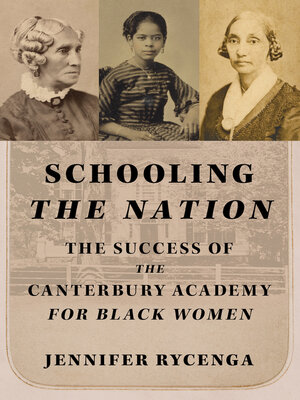Schooling the Nation
ebook ∣ The Success of the Canterbury Academy for Black Women · Women, Gender, and Sexuality in American History
By Jennifer Rycenga

Sign up to save your library
With an OverDrive account, you can save your favorite libraries for at-a-glance information about availability. Find out more about OverDrive accounts.
Find this title in Libby, the library reading app by OverDrive.



Search for a digital library with this title
Title found at these libraries:
| Library Name | Distance |
|---|---|
| Loading... |
Jennifer Rycenga recovers a pioneering example of antiracism and Black-white cooperation. At once an inspirational and cautionary tale, Canterbury Academy succeeded thanks to far-reaching networks, alliances, and activism that placed it within Black, women's, and abolitionist history. Rycenga focuses on the people like Sarah Harris, the Academy's first Black student; Maria Davis, Crandall's Black housekeeper and her early connection to the embryonic abolitionist movement; and Crandall herself. Telling their stories, she highlights the agency of Black and white women within the currents, and as a force changing those currents, in nineteenth-century America.
Insightful and provocative, Schooling the Nation tells the forgotten story of remarkable women and a collaboration across racial and gender lines.
|Foreword Kazimiera Kozlowski
Preface
Acknowledgments
Introduction. A Luminous Moment
Conclusion. Hearing All the Voices
Notes
Bibliography
Index
|"Jennifer Rycenga's book is a brilliant work of scholarship that positions the Black and Brown young women of the Canterbury Female Boarding School as leaders in their own fight for education and early civil rights. Dr. Rycenga has accomplished what few scholars have done: to use history as a roadmap for today to seek justice in education and continue the work of Maria Davis, Sarah Harris, and Prudence Crandall. Dr. Rycenga's research has changed the way this story is told."—Joan M. DiMartino, Museum Curator and Site Superintendent, Prudence Crandall Museum"Original and enlightening. Delving deeply, Rycenga explores Crandall's life and influences while revealing the students who attended the Academy as members of a remarkable group."—Julie Winch, author of A Gentleman of Color: The Life of James Forten
|Jennifer Rycenga is a professor emerita of comparative religious studies and humanities at San José State University. She is the coeditor of Frontline Feminisms: Women, War, and Resistance.







